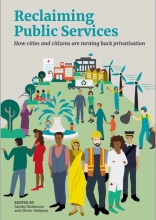Reclaiming Public Services: How cities and citizens are turning back privatisation

From New Delhi to Barcelona, from Argentina to Germany, thousands of politicians, public officials, workers, unions and social movements are reclaiming or creating public services to address people’s basic needs and respond to environmental challenges.
They do this most often at the local level. Our research shows that there have been at least 835 examples of (re)municipalisation of public services worldwide since 2000, involving more than 1,600 municipalities in 45 countries.
Why are people around the world reclaiming essential services from private operators and bringing their delivery back into the public sphere? There are many motivations behind (re)municipalisation initiatives: a goal to end private sector abuse or labour violations; a desire to regain control over the local economy and resources; a wish to provide people with affordable services; or an intention to implement ambitious climate strategies.
Remunicipalisation is taking place in small towns and in capital cities, following different models of public ownership and with various levels of involvement by citizens and workers. Out of this diversity a coherent picture is nevertheless emerging: it is possible to build efficient, democratic and affordable public services. Ever declining service quality and ever increasing prices are not inevitable. More and more people and cities are closing the chapter on privatisation, and putting essential services back into public hands.
Key findings of the book
- There are better solutions than privatisation
- Remunicipalisation is far more common than presumed, and it works
- Remunicipalisation is a local response to austerity
- Remunicipalisation is a key strategy for energy transition and energy democracy
- Bringing services back in-house is ultimately cheaper for local authorities
- Remunicipalisation drives better, more democratic public services
- Remunicipalisation presents 835 more reasons to fight trade and investment deals
- Lessons learned: Don’t privatise in the first place
- Remunicipalisation provides opportunities for new, diversified, democratic public ownership
- Remunicipalising cities and citizens groups are working together and building networks
Seven years ago the City of Paris brought their water supply back into public hands. On 23 June 2017, they received one of the highest international public service awards at a special UN ceremony at The Hague. The Eau de Paris remunicipalisation is included in the publication as a key case study for how local communities can fight to win back public goods.
Available for download:
For more information:
- See PSI's work around Privatisation and PPPs
- See PSI's work in the Local and Regional Government / Municipal sector
- Subscribe and/or contribute to our global Privatization Watch newsletter.

